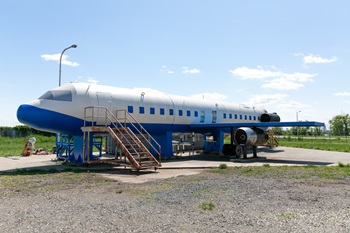Safety is of the utmost priority at Philadelphia International Airport (PHL). One of the ways the airport remains prepared for emergencies and maintains the highest safety standards is through upgrading the Aircraft Rescue and Fire Fighting (ARFF) unit’s fire safety training equipment to the latest industry technology. These critical facility upgrades are part of PHL’s multi-billion dollar capital development program.
The ARFF Fuel Spill Trainer Project project commenced in mid-July 2022, and updates so far include upgrades to the ground underneath the Fuel Spill Trainer (FST) and retrofitting the Specialized Aircraft Fire Trainer (SAFT) with new burning areas and doors. Substantial completion was reached at the end of March.
The FST construction occurred on site at the PHL training facility, whereas the SAFT was constructed at the contractor’s machine shop in Ohio and transferred to PHL after retrofitting was complete. Only three companies in the world complete large retrofits of this type of infrastructure.
This updated equipment and the team that manages it protects the airport, surrounding community, and all passengers who travel through PHL from fire emergencies. The Fuel Spill Trainer Project also includes training for staff on these new technologies as well as maintaining safety certifications. ARFF training captains are the first to be trained, followed by the rest of the ARFF team.
Deputy Chief Kamau Bright leads Engine 78 and the ARFF. He has played a key role in the coordination of this project and the annual training of ARFF staff as well as staff from nearby municipalities. Coordination of this work is a high priority because of the simultaneous, two-phase construction across multiple locations.
These emergency protocols follow Federal Aviation Administration (FAA) fire and rescue requirements to address fire emergencies on the airfield and inside the aircraft. This is an ongoing training requirement governed by the FAA Part 139 airport certification. Firefighting personnel need to maintain certification year-round.
The risk of fuel or foreign combustions is taken very seriously in all areas within PHL property. Just as the rest of the Philadelphia Fire Department maintains their certifications and equipment, this work acts as an essential part of fire prevention and safety.








